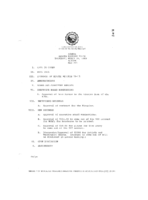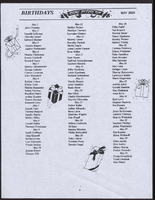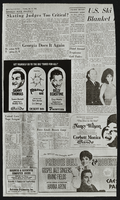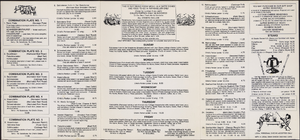Search the Special Collections and Archives Portal
Search Results

Chris Davis, Debbie Davis, and Mynda Smith oral history interview: transcript
Date
Archival Collection
Description
Oral history with Chris Davis, Debbie Davis, and Mynda Smith conducted by Claytee D. White and Barbara Tabach on May 24, 2018 for the Remembering 1 October Oral History Project. In this interview, Debbie and Chris Davis and Mynda Smith discuss the murder of their daughter and sister (respectively), Neysa Davis Tonks, at the Route 91 Harvest Country Music Festival on October 1, 2017. They discuss plans to form Fifty-Eight Loved and Never Forgotten, a foundation to help educate the children of the 58 families affected that night. Neysa, a single mother, left behind three sons, 24, 18, and 15 years of age. The family members recall how they were first alerted to Neysa's death, and having to locate and identify her body at the coroner's office twenty-four hours later. Chris, David, and Mynda reflect on Neysa's life, her work, and legacy. Debbie, Chris, and Mynda believe that "darkness cannot exist in the presence of light. Neysa's light will shine forever."
Text

Aruba Hotel (Thunderbird) Neon Survey document, August 30, 2017
Date
Archival Collection
Description
Information about the Aruba Hotel (Thunderbird) sign that sits at 1215 S Las Vegas Blvd.
Site name: Thunderbird Hotel and Casino (Las Vegas, Nev.)
Site address: 1215 S Las Vegas Blvd
Sign owner: 1215 Las Vegas Blvd LLC; C.F. Saticoy, LP
Sign details: The building was constructed in 1964 (Assessor). A vintage postcard from 1967 shows the Lotus Inn Motel and a Sambo's restaurant (VintageVegas.com, 2017). The hotel was renamed the Monte Carlo Inn in 1979, but reverted in the 1980's to the Lotus Inn (VintageVegas, 2017). In 1985, it became the Tally Ho (VintageVegas). Casino owner Bob Stupak renamed it the Thunderbird in 1986 or 1987 (VintageVegas). Stupak proposed building 15-story, $400 million resort hotel called the Titanic on the site, but vocal opposition from residents of the nearby John S. Park neighborhood and a trademark controversy derailed the project (Knightly, 2014). The property was renamed the Aruba Hotel in the early 2000's and became the Thunderbird in 2016 (O'Brien, 2016; VintageVegas). As of April 2017, a 15-story residential building was planned for the site (Carter, 2017).
Sign condition: Condition is 5, excellent. The lower portion of the sign is wrapped in plastic. The exposed upper portion of the sign shows the cabinet, paint and neon all in new condition. All of the neon tubes are intact and functioning.
Sign form: Blade
Sign-specific description: The lower portion of the rectangular metal cabinet is wrapped in black plastic. "THUNDERBIRD" is spelled out in white blocks and red serif letters which run vertically down both sides of the plastic wrap. The upper portion of the cabinet is exposed. The cabinet is topped by a bird shape facing the street. The bird and visible part of the rectangular cabinet are painted forest green. Both sides of the bird are covered in white, blue, pink, yellow and green skeleton neon. Underneath the bird , a horizontal yellow skeleton neon tube is visible.
Sign - type of display: Neon
Sign - media: Steel
Sign environment: Las Vegas Blvd north of the Strip. Property is surrounded by other motels and wedding chapels.
Sign - date of installation: c. 2007
Sign - thematic influences: Tropical, Caribbean and Old Vegas. The parrot on top of the sign closely resembles the symbol of the former Thunderbird hotel on the Las Vegas Strip. The property has used the Thunderbird name intermittently since the 1980's, even when it was the Aruba hotel and the word "THUNDERBIRD" appeared over an "Aruba" sign. (Vegas24Seven, 2012)
Survey - research locations: Assessor's website
Survey - research notes: Carter, J. (2017 April 27). Fights are brewing over a proposed 15-story building downtown. Las Vegas Weekly. Retrieved from https://lasvegasweekly.com/intersection/2017/apr/27/fights-are- brewing-over- proposed-building- downtown/ Knightly, A. M. (2014 August 31). A history of landmarks never built. Las Vegas Review Journal. Retrieved from https://www.reviewjournal.com/news/a-history- of-landmarks- never-built/ O'Brien, J. (2016 January 21). Thunderbird Hotel reopening with former Arts Factory owner at helm. Retrieved from http://vegasseven.com/2016/01/21/thunderbird-hotel- reopens/ http://www.vegas24seven.com/substance-cd- release-sinicle- the-great- circuiting-mechanical- death-a- sinners-confession- at-the- aruba-hotel- saturday-june- 30th/ Vegas24Seven.com. (2012). Substance CD Release, Sinicle, The Great Circuiting, Mechanical Death, A Sinners Confession at The Aruba Hotel Saturday June 30th . Retrieved from Vintage Vegas. (2017 February 16). Archive: Lotus Inn Motel, c. 1967. Retrieved from http://vintagelasvegas.com/post/157345077754/lotus-inn- las-vegas Zeitzer, I. (2007 June 29). On The One, The Aruba Hotel " Las Vegas, NV- 6/22. Retrieved from http://www.jambands.com/reviews/shows/2007/06/29/on-the- one-the- aruba-hotel- las-vegas- nv-6-22#ixzz4rBUwxlkh
Surveyor: Mitchell Cohen
Survey - date completed: 2017-08-30
Sign keywords: Blade; Neon; Steel
Text
Homer Rissman Architectural Records
Identifier
Abstract
The collection is comprised of architectural records (1947-2001) of American architect, Homer Rissman and the architectural firm, Rissman and Rissman Associates Ltd, a partnership of Homer Rissman and his brother Marshall. The collection includes 825 items from over 40 major projects and over 110 minor projects. The Rissmans' work represented in the collection focused on Las Vegas, Reno, and Lake Tahoe, Nevada, Los Angeles, Southern California, and Arizona, with Homer's early career design work in Chicago, Illinois. The materials feature hand-drawn architectural drawings, ranging from pencil and ink on tracing paper preliminary sketches to ink on Mylar (TM) construction documents, and a number of artist’s renderings, used for presentations and promotional materials. The drawings also contain work from a number of consultants, engineers, and other architects who collaborated on the development of the various projects. The collection includes architectural drawings for: hotels, casinos, integrated casino resorts, office towers, multi-family residential developments, and custom single-family homes.
Archival Collection
UNLV University Libraries Collection on Nevada Mining
Identifier
Abstract
The Nevada Mining Collection is comprised of records that document mining and mines in Nevada from 1842 to 1966. The majority of the collection includes records of various mines and mining companies located in the Esmeralda, Lincoln, Clark, White Pine, and Nye counties, dating from 1900 to 1928. The collection includes financial, administrative, and business related records; photographs of miners, mining camps, and towns; correspondence; maps; newspaper clippings, pamphlets, newsletters, and booklets.
Archival Collection

Meeting minutes for Consolidated Student Senate University of Nevada, Las Vegas, March 30, 1989
Date
Archival Collection
Description
Text

Transcript of interview with Joyce Moore by Claytee D. White, January 22, 2013
Date
Archival Collection
Description
Joyce Moore's family moved to Las Vegas from Chicago in 1953, when she was eight years old. She attended Rancho High School, married and had three daughters, and currently lives in Las Vegas. Joyce's father was in the gaming industry and her mother was a nurse. Growing up in Las Vegas meant going to shows with her mother, spending summer days in the pool at the Showboat Hotel, and riding horses to the Last Frontier. While a teenager at Rancho High school, Joyce worked at several movie theaters including the Huntridge, went to school dances and marched in the Hellodorado Parade. After her divorce, Joyce returned to work to support herself and her children, first at the Daily Fax then later on the Strip at the Aladdin and Circus, Circus doing a variety of office and accounting jobs. As a lark she and a friend applied to work as cocktail waitresses at the MGM; she was hired and spent the next five years in a job that was by turns interesting, exhausting, frustrating and fun. This interview covers several periods of Joyce's life - her childhood, teen years, and early adult life - and what it was like to grow up, live and work in Las Vegas in from the mid-1950s until the mid-1970s.
Text

Transcript of interview with Sonja Saltman by Barbara Tabach, August 18, 2015
Date
Archival Collection
Description
Included in this oral history are reminiscences of Sonja Saltman's personal non-Jewish heritage in Austria, the importance of her grandmother in her life, and how she recalls becoming part of the Jewish community.
Sonja Saltman is a psychologist and philanthropist in Las Vegas, Nevada. She is executive director and co-founder of the Existential Humanistic Institute, a non-profit organization based in San Francisco, California that offers training in existential-humanistic therapy and theory. In 2003 Sonja and her husband Michael Saltman founded the Saltman Center for Conflict Resolution at the University of Nevada, Las Vegas (UNLV) William S. Boyd School of Law. The Saltman Center is focused on research, teaching, and public service related to "the advanced study of the nature of conflict and how to resolve it." A native of Austria, Sonja Saltman also serves as the Honorary Consul for Austria in Las Vegas. The Saltmans are involved with multiple charitable organizations and initiatives, both locally and abroad. Sonja Saltman has served on the boards of the Anti-Defamation League, Nevada Women's Philanthropy, and the Black Mountain Institute. Projects that the couple has supported include the rebuilding of homes and bridges is Bosnia, and Streetball Hafla, a basketball program to improve relations between Jewish and Arab teenagers in Israel. In 2014 Sonja and Michael Saltman were recognized as Distinguished Nevadans by the Nevada System of Higher Education. Included in this oral history are reminiscences of her personal non-Jewish heritage in Austrian, the importance of her grandmother in her life, and how she recalls becoming part of the Jewish community.
Text



